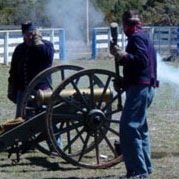
Henry Hopkins Sibley (May 25, 1816 – August 23, 1886) was a brigadier general during the American Civil War, fighting in the Confederate States Army in the New Mexico Territory.
The Sibley family was originally from the English-Scottish border area. In 1629 they had come to America with the Winthrop Expedition and settled in Massachusetts. Henry's grandfather Dr. John Sibley had served as a medic in the War of Independence. After the death of his first wife Elizabeth Hopkins, to which son and grandson owe their middle name, he moved to Louisiana. Dr. John Sibley settled down on the banks of the Red River at Natchitoches. In 1803 he conducted an expedition of Western Louisiana for the federal government. In 1811 his son Samuel Hopkins Sibley followed him to Natchitoches, where he served as a parish clerk from 1815 on until his death in 1823.
When Henry Hopkins Sibley was seven years old he was sent off to live with his uncle George Champlin Sibley and his wife Mary Easton. They founded the Miami University in Oxford, Ohio, which was also attended by Henry. At the age of 17 Henry entered the United States Military Academy at West Point.
He graduated from the United States Military Academy in 1838 and was commissioned a second lieutenant in the 2nd U.S. Dragoons.
In the 1850s, he invented the "Sibley tent", which was widely used in the frontier afterwards. He also invented the "Sibley stove," used until the advent of World War II.
During the American Civil War, his unsuccessful New Mexico Campaign was intended to control the Santa Fe Trail up to Colorado and from there gain access to the warm water ports of California. However, he was forced to retreat after the Battle of Glorieta Pass (called "Gettysburg of the West"), when he lost his supply train and faced an approaching California Union column. His opponent was Colonel Edward Canby, formerly a comrade in arms in the U.S. Army. Sibley's retreat to San Antonio in 1862 ended the aspirations of the Confederate nation to stretch to the Pacific Ocean and utilize the mineral wealth of California.
After the failure of his New Mexico campaign, Sibley was given minor commands and struggled with alcoholism. In 1863, he was court martialed in Louisiana. Although not convicted of cowardice, he was censured. After the war, he served as a military advisor to the Khedive of Egypt before returning to the United States where he died at Fredericksburg, Virginia, in poverty. He is buried in the City Cemetery at Fredericksburg.
Union General and Governor of Minnesota, Henry Hastings Sibley, was a distant cousin.
Sibley is referenced (and seen briefly) in the film The Good, the Bad and the Ugly.
No comments:
Post a Comment